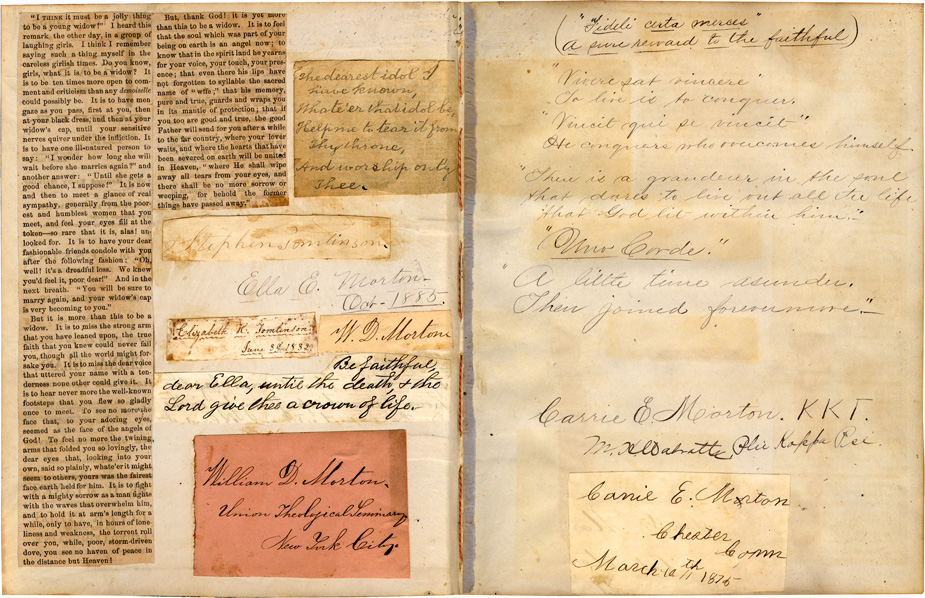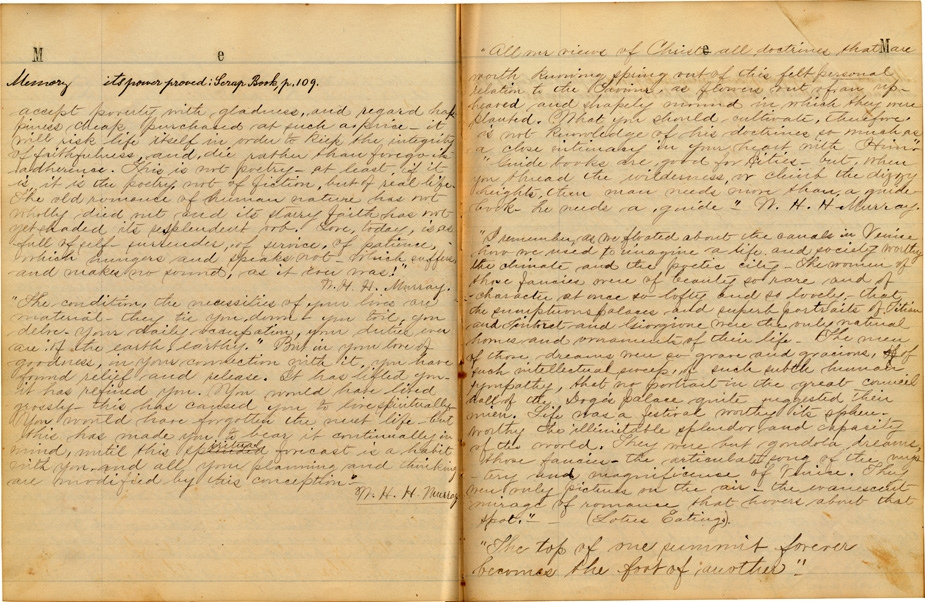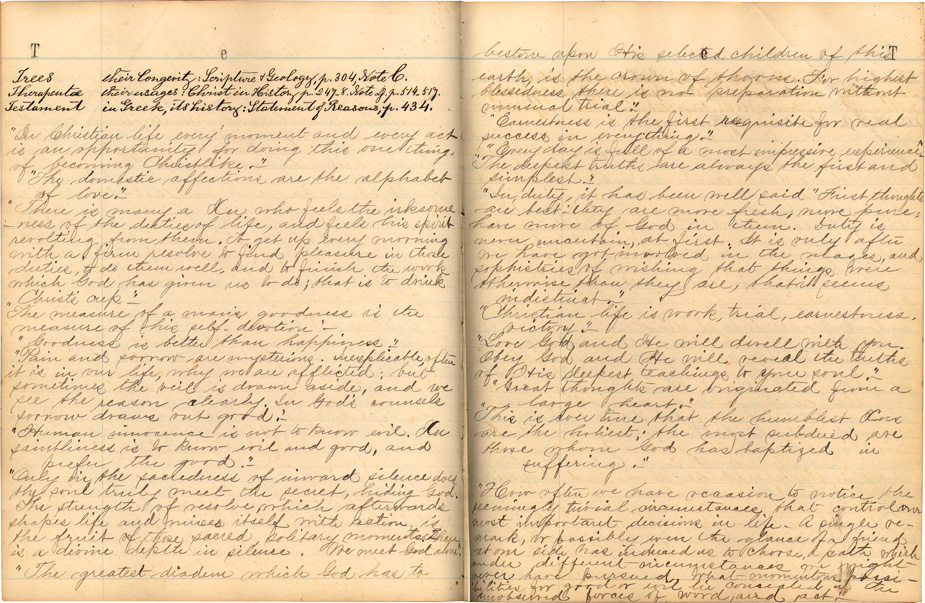This copy had two authors. William D. Morton used it in the way it was intended. He died, however, and his widow Elizabeth proceeded to fill its empty pages with extracts from inspirational and comforting poetry, spiritual and other material (Carlyle, Emerson, Humboldt, Lucy Larcom, et al) while awaiting God’s call to rejoin her husband.
This volume is almost entirely filled in, by index entries, extracts and, in five or six preliminary and endmatter pages, pasted autographs, quotations, carefully scissored postmarks and a newspaper clipping regarding the trials of widowhood.

Shown above, inside front cover, first flyleaf. Among the autographs are two by Carrie E. Morton (a daughter?), one indicating her women’s fraternity, the other, in enfeebled handwriting, dated March 10, 1875, Chester, Conn. In these front and end pages are pasted autographs, quotations, carefully scissored postmarks and a newspaper clipping regarding the trials of widowhood. Not readily visible here is evidence that two or three lines of (autograph?) handwriting have been energetically erased/scoured from these two pages.
This volume is almost entirely filled in by index entries and extracts.
MeeM

The entries by William D. are:
Aratus; Aged; Battles, Baptism, Banking, Baptism, Baptisteries, Baptism, Baptists; Bible, Blind; Burr; Creed; Christ, Christianity, City, Child; Congregationalists, Cotton (gin, its inventor : Scrap Book, p. 39, its history, p. 40-41), College, Constitution, Columbus, Congregationalism, Conscience; Church, Currency; Deluge, Deacons, Dead; Diognetus, Divorces; Doddridge; Drunkeness; Earthquake (at Riobamba, In Peru); Essenes; Epicureanism; Flag; Fire (how extinguished; Cuba with Pen & Pencil, p. 151); Flood, its tradition wide-spread: Christ in History, p. 128; Galileo; Geology, Gehenna; Globe; Hume; Infallibility; Inventions; Immortality; Indulgences; Jerusalem, Jesuits; Joshua, Job, John 15;7; 1 John 5;7; Justin, Jus; Knowledge (its desire natural to mankind: Facts for Boys, p. 39); Life; Logos, Loretto; Mariolatry; Memory (its power proved, Scrap Book p. 109); Mines, Miracles; Mountains, Moravians, Money; Niagara; Prayer, Pharisees; Pelagius; Pilgrim; Population, Pope, Poets; Queens; Religion, Rebellions, Rebaptism; Rosetta, Roman, Romanism, Rome; Sadducees, Synagogue; Semi-Pelagians; Sin, Singing; Sovereigns, Socrates, Stoicism; Surnames (when first used), Sublimity, Superstition, Sunday Schools (origin & influence of); Tracts (when written & circulated; Scrap Book, p. 135); Trees, Theraputae, Testament; Trinity, 1 Timothy 3:16; Volcanoes; Wonders (in America: Scrap Book, p. 104); additional pages : Baptism; Congl. Polity; Revival; Crashaw.
Morton’s entries are few enough, that I will endeavor to list all of them, in part so that I might better address the contribution of Ella whose extracts form the bulk of this copy.
- Samuel Hazard. Cuba with Pen and Pencil (London, 1873) here
- Robert Turnbull. Christ in History or, The Central Power among Men. (Boston 1857) here
It is unclear whether Scrap Book
referred to in many entries (a couple of them listed above) was a contemporary periodical, or a separate scrapbook maintained by Morton. If the latter, this Index Rerum serves as an index to that scrapbook, in addition to other sources.
TeeT

When I first, and hurriedly, described the Morton copy of Index Rerum, I slighted the extracts of Ella Morton, favoring the fewer, but more emphatically written (because in thicker, black ink) entries of her husband. I see now, a couple of years later, that this bias allowed no justice to be done to the whole volume. Ella’s extracts may be her notes of sermons, or drawn from published sermons and other material. Among the names are:
- William H. H. Murray, author of Park-Street Pulpit: Sermons Preached by William H. H. Murray (Boston, 1871) here.
- Professor C. D. Hartrauft (of Hartford Theological Seminary?), a passage dated Nov 2, 1879
- Rev. M. Willard, January 25, 1880
- George MacDonald.
All the doors that lead inward to the secret place of the most High are doors outward — out of self, out of smallness, out of wrong.
Included in Selections from the Writings of George Macdonald or Helps for Weary Souls, compiled by J. Dewey. (Chicago 1889) here.
more to come.